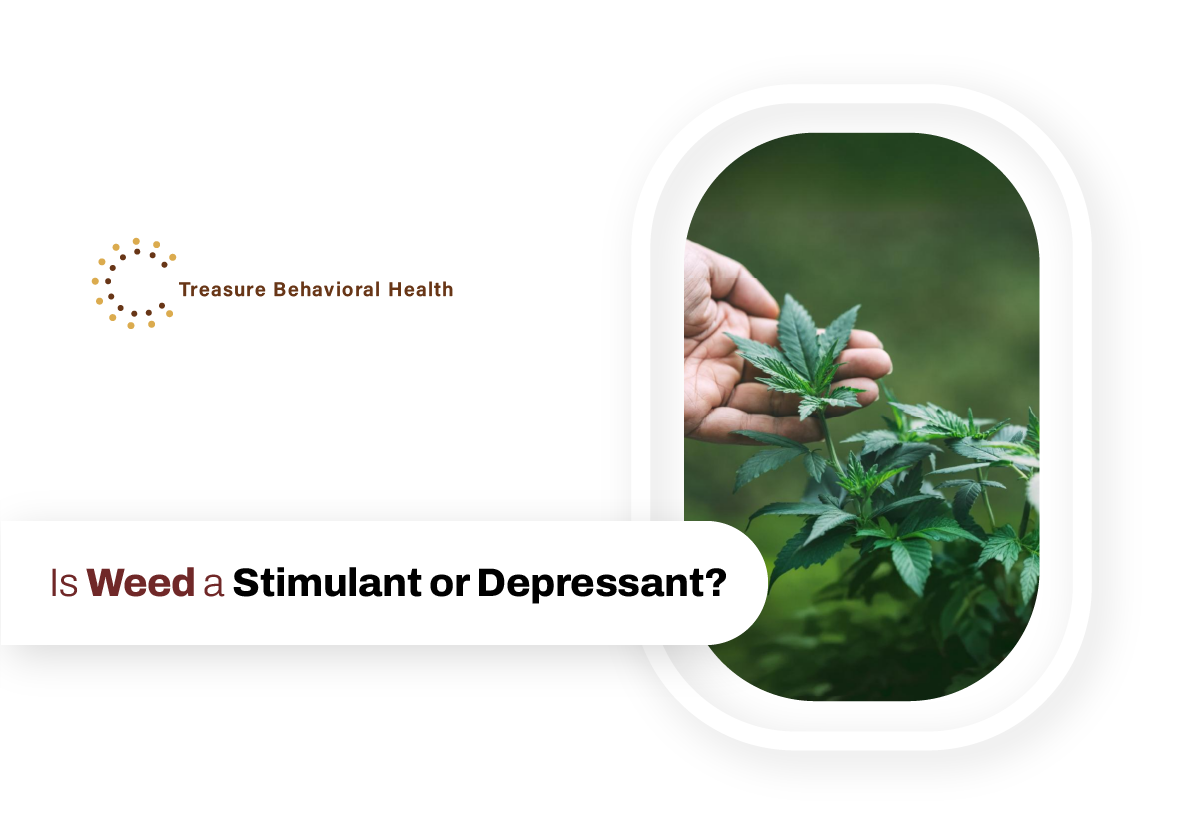Weed also known as marijuana or cannabis is a substance with various influences on the body and mind.
There’s an ongoing discussion about whether weed is a stimulant or a depressant. And the answer isn’t simple.
Let’s discuss, is weed a stimulant or depressant?
If you or a loved one is struggling with substance abuse, Treasure Behavioral Health can help. They provide substance abuse recovery and management.
What Is Weed?
Weed is a plant with both medicinal and recreational uses. The plant has compounds named cannabinoids. The most famous of these is THC (tetrahydrocannabinol).
This is what causes the plant’s mind-altering effects. These effects might change how you sense things, alter your mood, or cause memory loss.
You can use cannabis in many ways. People smoke it, vape it, eat it in edibles, or use it in tinctures.
Does weed relax muscles? Yes, weed can help relax muscles. Its effects may ease tension and reduce muscle spasms, though results can vary between individuals. Users turn to it to ease pain, control nausea, or boost their hunger.
But remember, its effects can differ a lot. It depends on the type of cannabis and how you use it.
Drugs are Sorted by Efficacy and Characteristics
Typically, they’re in one of four groups:
- Depressants: The brain functions slower like alcohol, Xanax, and barbiturates belong here.
- Stimulants: These mood boosters and energy increasers can be addictive and can lead to paranoia. Cocaine, meth, and ADHD medications are examples.
- Hallucinogens: These drugs change how brain nerves talk to each other, altering reality perception. LSD, psilocybin, and MDMA are types.
- Opiates: These potent pain relievers create quick euphoria but can be addictive and affect the brain long-term. Heroin, morphine, and similar prescription painkillers are examples.
Weed as a Depressant
Weed, also known as Cannabis, isn’t exactly one-size-fits-all. Its impact can vary depending on the individual and the precise strain.
The weed can function as a downer, an upper, or even a psychedelic. But it’s never labeled as an anesthetic. Look into it to understand how cannabis can produce these assorted effects.
Marijuana can act as a downer. This means it impacts your nervous system and severs the speed of your brain’s activities. This dual action can ease nerves and unwind tight muscles. Such downers can be used to manage multiple conditions like sleeplessness, stress, or muscle twitchiness.
However, they can lead to unpleasant immediate effects including:
- Nausea
- Dizziness
- Confusion
- Reduced motor coordination
- Low blood pressure
- Slowed breathing
- Slurred speech
- Lightheadedness
- Blurred vision
- Short-term memory loss
Weed can trigger similar positive and negative effects, like:
- Feeling relaxed
- Drowsiness
- Loosened muscles
- Short-term memory loss
- Dizziness
Weed, a kind of depressant, usually poses a less addiction risk compared to many other drugs. But beware! Some depressants, like barbiturates, can be riskier. As days pass, you might need more weed to feel the same way because your body gets used to it.
Depending on weed to aid your sleep? In the long run, you might struggle to sleep without it. Plus, inhaling weed might annoy your airways, escalating your chances of breathing troubles, say chronic cough or bronchitis.
To look deeper, have a look at how weed influences your body.
Weed As a Stimulant
Stimulants energize, unlike depressants. They generally increase your pulse and blood pressure, leading to faster breathing for some.
They can brighten your mood, particularly straight after you consume them. Contrary to the relaxant effects of depressants, stimulants awaken you and make you feel effused.
They can also help prolong your focus. However, stimulants may have harmful, even risky, side effects, such as:
- Heightened body temperature
- Ungrounded fear
- Irregular heart rhythms
- Apprehension
- Seizures
- Heart dysfunction
Weed can act as a stimulant, potentially causing:
- Uplifted spirits
- A quickened heartbeat
- Stress, and unwarranted suspicion
Yet, weed’s impact varies for everyone. Some might feel calm, while others may experience anxiety or restlessness.
Weed is generally less risky than other stimulants. Methamphetamine and cocaine, for instance, are highly addictive and can harm your brain and body long-term.
As a stimulant, weed also holds risks similar to those of a depressant. This could lead to dependence on its mood-lifting effects, and smoking can cause respiratory problems.
In Conclusion-Is weed a stimulant or depressant?
Weed has effects that can vary widely, acting as both stimulants and depressants depending on the individual and the strain used.
It can either slow them down or hype them up. With effects like a downer, it could make the user relaxed and quiet, but it can also lead to things like memory loss for a short time and breathing issues.
Just like an upper, weed can enhance emotions and make the heart beat faster, but it might bring on worries or fear in some.
Knowing its varied effects is critical to using it cautiously and realizing its probable hazards.
FAQs
Can weed affect memory?
Yes, weed could affect your short-term memory while you’re on it, making conception or remembering more challenging.
Are there risks with using weed?
The hazards may include respiratory problems due to smoking, addiction, and changes in one’s mental state. Also, it might trigger nervousness or anxiety in specific individuals.
Is weed addictive?
While weed is generally viewed as less addictive compared to other drugs, specific individuals may still become dependent if it is commonly used.
How does weed affect sleep?
In some individuals, weed might assist with sleep, but chronic usage could make sleep without it more challenging over time.


No comment